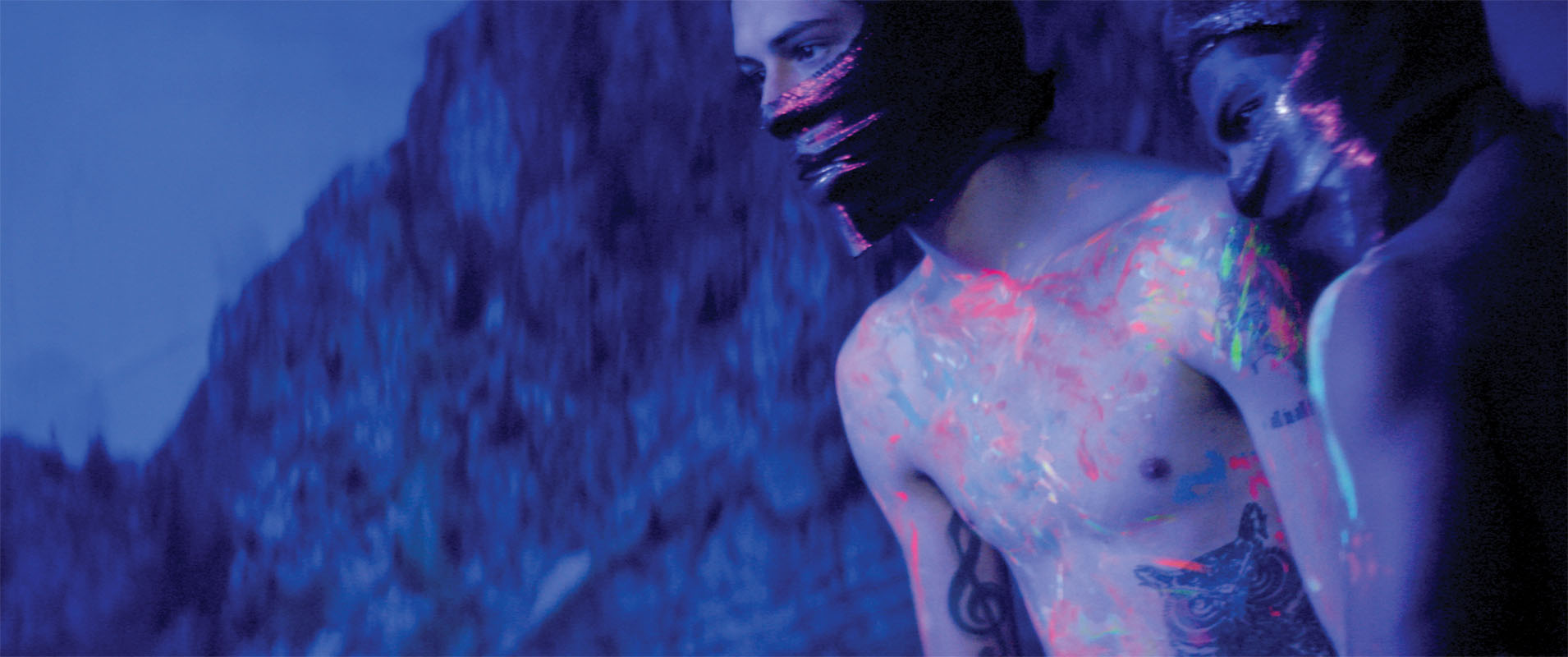Film Review: “Hard Paint” at Reel Affirmations XTRA
Hard Paint is a vivid, beautiful exploration of a troubled, isolated mind

Slow-burning, emotional, and unashamedly erotic, Hard Paint (![]()
![]()
![]()
![]()
![]() ) — or Tinta Bruta in its native Brazilian Portuguese — at times feels more like an art installation than a film. Through pulsating techno music, spare dialogue, and the expressions of its lead actor, it weaves a story that, while narratively speaking lasts around a month, feels both intensely compact and also unendingly long. As viewers we watch, unsure of its motives, while being treated to some of the most sumptuous visuals ever witnessed in queer cinema. As an experience, it polarizes — like the best art always does — leaving an uncertainty as to whether 118 minutes of exposure was entirely worth it.
) — or Tinta Bruta in its native Brazilian Portuguese — at times feels more like an art installation than a film. Through pulsating techno music, spare dialogue, and the expressions of its lead actor, it weaves a story that, while narratively speaking lasts around a month, feels both intensely compact and also unendingly long. As viewers we watch, unsure of its motives, while being treated to some of the most sumptuous visuals ever witnessed in queer cinema. As an experience, it polarizes — like the best art always does — leaving an uncertainty as to whether 118 minutes of exposure was entirely worth it.
At its core, Hard Paint, from Brazilian writer-director team Marcio Reolon and Filipe Matzembacher (Seashore), is the story of a troubled young adult who shuns the real world in favor of performing on a webcam for internet strangers. Pedro, played with waifish, semi-androgynous intensity by Shico Menegat, is introduced at a court hearing for some unknown act of violence. Ushered home by his sister, this shy, awkward man, with his long hair and blank face, transforms into NeonBoy, a webcam star who attracts his audience by painting his body in neon paints made gloriously luminescent by the black lights placed next to his laptop.
Pedro’s already isolated world quickly crumbles when his sister moves away for a new job, leaving him completely alone. She urges that he leave the house for five minutes a day, moments that give glimpses into Pedro’s psyche as every glance from a stranger, every sideways look, every unknown face leering from a window is given added menace, or implied disapproval. Whether it’s truly real or merely imagined, we don’t know, but it’s enough to send Pedro scuttling back inside to the safety of his internet bubble.
That is until he learns that another webcam performer, Boy25, has stolen his act, and is similarly painting himself on camera Pedro, faced with decreased audiences and earnings, decides to confront Boy25 — real name Leo. It’s here that Hard Paint, which meanders through its first 20 minutes or so, kicks things up a gear. Bruno Fernandes is a revelation as Leo. He is the antithesis of Pedro — unreserved, unashamedly erotic, in touch with his body, and a free-spirited performer. Pedro witnesses this firsthand when he leaves the webcam room, instructing Pedro not to give anything away for free to the waiting audience. Then the lights go out, the music kicks in, and we return to see Leo in his full glory.

While highlighting neon paint with black lights isn’t anything new, Reolon and Matzembacher’s use of the visual in Hard Paint is masterful. As music pulsates in the background, Leo writhes and contorts, swathing his body in paint in a way far more sensual than Pedro’s reserved nature will allow. It is perhaps the film’s standout scene — and there are more than a few — and an eye-opening moment for both Pedro and the audience.
Hard Paint‘s narrative opens up as Pedro and Leo quickly become dual performers, and Leo gradually draws Pedro out of his shell. While their burgeoning feelings for one another could have reduced the film to sentimental nothingness, Reolon and Matzembacher instead use the romance to lend sympathy and depth to Pedro. We learn why he was in court, his history of homophobia, the reason why he feels everyone is watching, judging, waiting to attack him. Leo pulls Pedro into his world of art and dance and socializing, but there remains a creeping dread that Pedro’s own insecurities, his self-made isolation, will quickly return.
Hard Paint pulls no punches in its storytelling, charting Pedro’s attempts to navigate three very distinct emotional traumas, as his illusion of control slips from grasp. A third act twist further yanks the rug from under his feet — an attempt to recruit another performer, with Pedro establishing himself as the dominant partner, quickly devolves into a fight for his life.
Throughout, Menegat gives a natural, effective performance, and his chemistry with the scene-stealing Fernandes — including one explicit and lengthy sex scene — is palpable. And while Hard Paint predominantly uses techno music, an original score, with a pulsating, heartbeat-like rhythm, emphasizes the paranoia and fear in Pedro’s head when he’s outside or in danger. At home, when not performing, his world is near-silent.
Where the film stumbles is its length. At just under two hours, Hard Paint struggles to justify its running time. While Reolon and Matzembacher keep tight control of each scene, whether frenetic dance parties or quiet conversations or neon sex, the pacing is so languid — particularly during the first act — that some might switch off. While it could be argued that this unhurried pace makes Leo’s arrival and impact on Pedro all the more effective, there’s still at least twenty minutes of editing that could be done to improve things.
And while Pedro’s story, including a late film appearance from his grandmother — played beautifully and sorrowfully by Sandra Dani — who seems similarly lost and alone, is compelling, the film’s conclusion is a jarring juxtaposition to everything that comes before. It’s a powerful visual, and a wonderful, freeing moment for Pedro, but nothing about his life, his isolating existence, his frequent and crushing disappointments, suggests that it would happen.
Despite its flaws, Hard Paint is a notable new entry in the queer film canon. Whether for its powerful imagery and bold eroticism, or the quiet tale of a shattered individual trying desperately to hold onto a bubble of security that’s already burst, it makes for engaging viewing.
Reel Affirmations Xtra screens Hard Paint on Aug. 24 at 7 p.m. at the Human Rights Campaign, 1640 Rhode Island Ave NW. For tickets and more information, visit reelaffirmations.org.
Support Metro Weekly’s Journalism
These are challenging times for news organizations. And yet it’s crucial we stay active and provide vital resources and information to both our local readers and the world. So won’t you please take a moment and consider supporting Metro Weekly with a membership? For as little as $5 a month, you can help ensure Metro Weekly magazine and MetroWeekly.com remain free, viable resources as we provide the best, most diverse, culturally-resonant LGBTQ coverage in both the D.C. region and around the world. Memberships come with exclusive perks and discounts, your own personal digital delivery of each week’s magazine (and an archive), access to our Member's Lounge when it launches this fall, and exclusive members-only items like Metro Weekly Membership Mugs and Tote Bags! Check out all our membership levels here and please join us today!


























You must be logged in to post a comment.